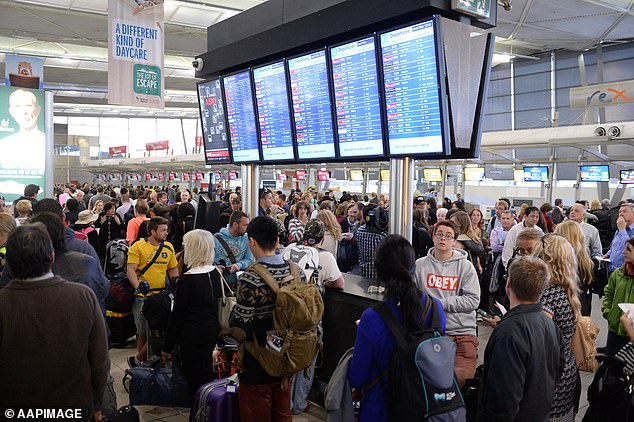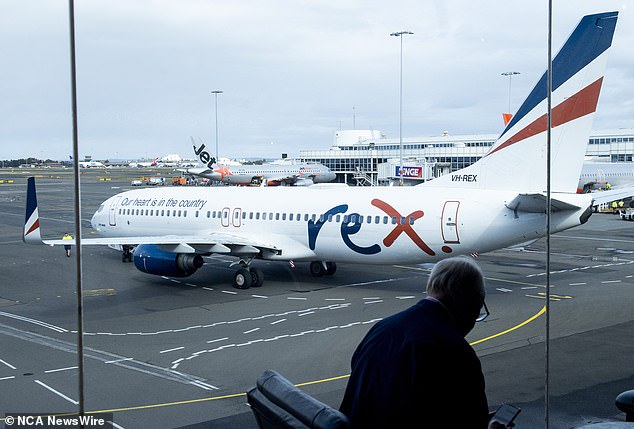First Bonza, now Rex: how the collapse of Qantas and Virgin Australia’s key rivals is set to send fares SOARING – and what happens to those who have already paid for their tickets?
An expert has warned that airfares are likely to rise as Rex teeters on the brink of bankruptcy and could become the next airline to go bust after Bonza.
According to financial news service Bloomberg, Ernst & Young will be announced as the managers of Rex on Wednesday. That is bad news for travelers.
Greg Bamber, a professor at Monash University and author of Up in the Air, said it would “reduce competition” and encourage Virgin and Qantas, “which form an oligopoly” in the market, to raise prices.
“That’s what usually happens when there’s less competition: the dominant players raise their prices,” he told Daily Mail Australia.
Professor Bamber said that when Bonza went bust in early July, ‘Virgin and Qantas both offered passengers free tickets on the routes they flew’.
But the challenge “For Bonza and Rex customers, they were typically flying regional routes, which in most cases were not flown by Qantas or Virgin,” he said.
“So it didn’t always work. In practice, those kinds of offers didn’t help most passengers.”
If Rex goes under, it could be a long time before another airline emerges in Australia that can challenge the dominant position of Qantas and Virgin.
With regional airline Rex on the verge of bankruptcy and Bonza going bust earlier this month, Qantas and Virgin Australia are likely to take advantage and send airfares through the roof. Bonza staff pictured
‘Australia has seen several examples of new entrants into the aviation market going bust over the years, not just Bonza and Rex, but further back in time.“We saw the demise of Ansett (in 2002), which was not a newcomer by the way,” said Prof Bamber.
‘The problem is that we have an oligopoly (in Australia) with one very strong player, a quasi-monopolist: Qantas, which has too much market power.
“The regulators have failed to rein in the dominant player Qantas. I think we deserve a higher level of regulation in Australia, which would curb the large market dominance of Qantas.”
According to Prof Bamber, a strong and competitive aviation industry is essential to Australia’s well-being.
“This is a huge country with huge distances between major population centres,” he said.
‘We don’t have an alternative way to travel between the centres because there is no high-speed rail system and the roads between the major cities are not world-class. They are far apart.
“So aviation is an essential sector in Australia.”
With a second airline potentially going bust within a month, Prime Minister Anthony Albanese said he was “concerned about Rex”.
“It is an important regional airline. What we will do is examine all proposals (to keep the airline going).”
He added that ‘Rex, as a regional airline, obviously has important connections with regional communities, and particularly between capital cities and regional communities. It’s important for those local economies.
“We want the aviation sector in Australia to continue to be a sector that provides these services and access.”
Opposition Party member Simon Birmingham said on Tuesday the government “must act urgently but also be very clear about how it acts”.
Mr Birmingham told Sky News that Labour needs to get its priorities right.
‘Government has responsibilities to taxpayers and travellers, not to shareholders. That was certainly the approach (the Coalition) took in relation to the Virgin difficulties (in 2020).
‘There are ways in which government can support and maintain routes that are essential to travellers, particularly in regional areas.
‘And there are ways in which they can act to ensure that the travelling public is protected.
“But they also need to act responsibly towards taxpayers. They should not compromise the interests of shareholders, or create an environment where taxpayers face the potential for significant losses.”

If Rex goes under, it could be a long time before another airline emerges in Australia to challenge the dominance of Qantas and Virgin
Will my Rex flight go ahead?
As of Tuesday afternoon, Rex’s website was no longer accepting bookings for services between capital cities such as Sydney, Melbourne and Brisbane.
Regional services, many of which are only operated by Rex, could still be booked.
Unlike Bonza, Rex owns its own aircraft, making it more likely, but not certain, that its flying obligations will be met in the event of bankruptcy.
More details are expected later today or Wednesday morning.
If you have a flight booked in the coming days or weeks, please contact the airline or your travel agent directly to ensure your flight is still going ahead.
How do I get my money back if Rex goes bankrupt?
On April 30, when it became clear that Bonza was on the brink of collapse, customers received text messages saying they would get their money back within three weeks as long as they completed an online form within 24 hours.
But that promise turned out to be a false promise and the directors of Hall Chadwick had other plans.

Unlike Bonza, Rex (the aircraft in the photo) owns its own aircraft, making it more likely, but not certain, that its flight obligations will be met while the company is in receivership.
On May 1, they announced that processing refunds for customers was not a priority.
Those who had booked a flight were considered unsecured creditors while the administrators decided what to do with the company.
Unsecured creditors are typically the last to get their money back, while secured creditors such as banks are the first to get the remaining money.
If Rex completely collapses, the situation will likely be similar to what happened to Bonza: customers will be at the back of the line for their money back.
